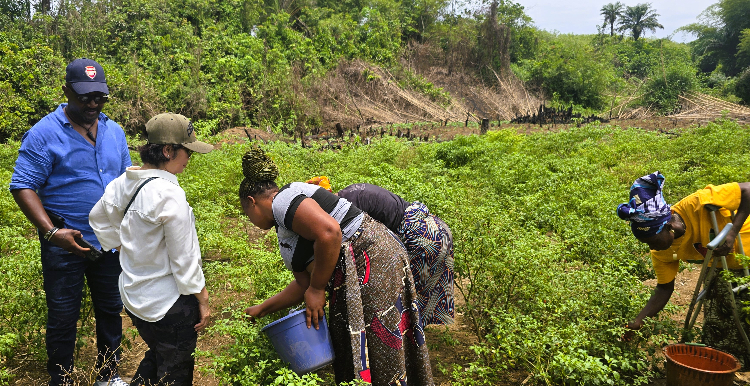Liberia: Pres. Boakai envoys tour communal farms
By James Kokulo Fasuekoi

Two of President Joseph Nyuma Boakai’s envoys, Jackson K. George Jr., and Amb. Linda Karim-Creevey, spent much of Saturday, May 3, in boots, plodding swamp and highland communal farms owned by a Bassa women’s group in the village of Behneewein, near Owen Grove, along Buchanan Highway.
They covered several acres on the southside of the village, and crops such as corn, plantains, cassava and banana planted there weeks ago, have already sprung up to knee-level with the help of the April rainfall.
This is a self-help project, the first in the village involving up to 40 women, with most being widows and single moms.
Almost all are middle-aged women. They had been organized about a year now by Rev. Love Gibson, a staff working with Samaritan Purse-Liberia for over 19 years and also of Bassa origin from No.1 Compound in Grand Bassa County.
Their group is named in Bassa, meaning, “We Can Make It” Rev. Gibson said a brief ceremony before he led the tour.
George is executive director for JNB Foundation, Pres. Boakai’s charity, set up in 2018, to help local communities and people in need, particularly vulnerable women and children while Amb. Linda Karim-Creevey is the foundation’s ambassador at large. She was recently appointed By Pres. Boakai as Liberia’s Trade & Investment Rep. for Asia and Australia.
Both have quietly worked ceaselessly to restore hope in less-fortunate people here, and help restore their confidence so they can once more stand on their own.
In some cases, they have paired together, often traveling to urban and rural villages, organizing women and youth groups and encouraging them to engage in worthy projects such as sustainable farming, soap-making, pig-raising, weaving and culinary in order to help themselves.
After touring the women’s farm in the village’s southside, both George and Amb. Karim-Creevey Linda, accompanied by aides and villagers, moved to the village’s northside and inspected a large cassava and yam farm that belonged to Catherine Joe, a disabled and middle-aged woman turned-widow, living there and raising her six children.
Clad in a fine lappa skirt and wearing an ADIDAS T-Shirt, the single mom quickly waded through a narrow path leading visitors to her own farms at ease using her clutches.
The group then made its way through her okra and cornfields, crossed a bamboo bridge that runs over a stream to catch a glimpse of the amputee’s huge pepper farm on a hillside. The creek runs through her farms and she crosses it daily to work even when its tide flares up in the rainy season.
“Today, I crossed more than just a bamboo bridge. I crossed into the heart of the community I serve,” Amb. Karim-Creevey wrote and posted to her Facebook Timeline, hours after the trip to the disabled woman’s farms.
“This hand-built bridge, crafted by the hands of locals, wasn’t just a way across a stream; it was a powerful symbol of resilience, connection, and trust. Every careful step reminded me of how important it is to walk with our people, not ahead of them,” Linda observed.
The entire village of Behneewein, with its population roughly around 6,000 people, according to Rev. Love Gibson, fetches its drinking water from this stream’s upper side-a way of life here for as long as this village has existed.
A hand pump erected there by an NGO, or through the village’s self-help project soon ran dry just as it was finished, years ago; it left the villagers with no hope but to run back to drinking from the small stream.
Along the same creek are two designated spots downstream-just yards away from each other, where the village’s men and women get their daily baths, just like people still do in other parts of rural Liberia.
Gibson, a volunteer with JNB Foundation, last year helped organize Behneewein village women’s initial project in pig-farming in the area with the charity’s assistance. The project started with a seminar and the women, including a few men who completed it received certificates: the project now awaits its next phase.
Earlier, Linda gave the women’s group a purse of LD $20,000 as a sign of her appreciation for their hard work and promised to give the group seeds for planting.
Amb. Linda promised she would contact local supermarkets and arrange the sale of the women’s crops. She described Liberian women as being “strong” and also “the backbone of our nation,” meaning, women are Liberia’s breadwinners.
The group of women she referred to earlier as “my family,” gave her a rooster as a gift, an act deeply rooted in Liberian traditions.

